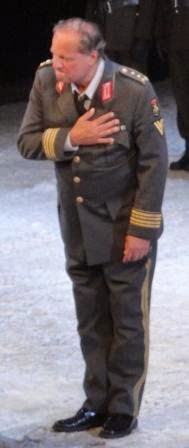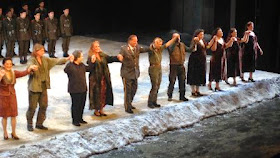(review in english below)
Assisti em Barcelona a duas récitas da ópera Die Walküre de R. Wagner, com elencos distintos. Neste primeiro texto relato as
minhas impressões sobre uma delas.
A encenação de R Carsen,
desinteressante e austera, traz a acção para a segunda guerra mundial. Tudo se
passa em diferentes cenários do campo de batalha, com excepção do início do 2º
acto, num imponente salão de inspiração nazi. A ópera é desprovida de qualquer
misticismo, quase todas as personagens são figuras militares (apenas Fricka e
Brünhilde são civis).
As incoerências cénicas são muitas. A espada Nothung está
num tronco totalmente a despropósito no contexto (um acampamento militar), dado
todos usarem metrelhadoras e outras armas de fogo. O início do 3º acto é muito
mau. As valquírias, vestidas de senhoras e ensaiando brincadeiras de criança,
beijam os heróis estropiados e mortos e estes a levantam-se, tipo zombies, e
sobem umas escadas ao fundo do palco. Mas o pior é o fogo sagrado, dividido
entre uma pequena vela pífia colocada a meio do palco (que numa das récitas se
apagou de imediato) e uma pequeníssima linha de chamas ao fundo, de intensidade
tipo “campingás” (que nem se via das primeiras filas da plateia, segundo me disse
um amigo).
A Orquestra Sinfónica
do Liceu esteve aquém do desejável, muito por culpa do maestro Josep Pons. As notas falhadas e fora de
tempo foram uma constante (e não apenas nos metais), o ritmo foi quase sempre
empastelado, sem variações rítmicas significativas e, sobretudo, sem transmitir
emoção.
*****
Die
Walküre, Liceu, Barcelona , May 2014 - Cast 1
I saw inBarcelona
The staging by R Carsen, uninteresting and austere, brings the action to the second world war. Everything happens in different scenarios of the battlefield, with the exception of the beginning of the 2nd act, an imposing hall with nazi inspiration. The opera is devoid of any mysticism, almost all the characters are military figures (only Fricka and Brunhilde are civilians).
The staging inconsistencies are frequent. The sword Nothung is on a trunk not adequate to the context (a military camp) because everyone uses machine guns and other firearms The start of the 3rd act is very bad. The Valkyries, dressed as ladiesm rehearse children's games, kissing the dead heroes and these arise, like zombies, and go up some stairs to the back of the stage. But the worst is the sacred fire, split between a small and ridiculous candle placed in the middle of the stage (in one of the performances it went out immediately) and a tiny line of flames in the background,(which is not even seen from first rows of the audience, a friend told me) .
The Symphony Orchestra of the Liceu was below desired level, much because of the conductor Josep Pons. Wrong notes and timings were constant (not only in the metals), the rhythm was often jammed, without significant variations, and especially without transmitting emotion.
Klaus Florian Vogt was a Siegmund of great vocal and scenic quality. The German tenor has a beautiful and very light voice, less suitable for a strong character like Siegmund . But thanks to his technical and scenic qualities, he was very credible, the connection with Sieglinde was excellent (despite the unfavorable staging) and presented us with a performance of superior quality. He was very convincing when calling Wälse and in Winterstürme he was touching.
Anja Kampe 's Sieglinde was at the same top level. The German soprano was sensational in the performance. She has a powerful, harmonious, full of enriching nuances voice that provided an interpretation of top quality, very well supported by her excellent acting capabilities.
The Eric Halfvarson’s Hunding completed an excellent first ac . A performer of cavernous, powerful and scary voice, as required in this role.
Japanese mezzo Mihoko Fujimura was a Fricka with class but not perfect. She revealed some vocal instability, especially at the beginning, but she sang the role convincingly and with good vocal projection .
Albert Dohmen was imposing as Wotan and showed that age does not mean lower performance quality. The German singer may be close to the end of his career but nevertheless he has a very beautiful timbre, always sings about the orchestra and only in the very top notes he breaks slightly. He was excellent and conveyed all interpretive power of an unsuccessful Wotan and, in the end, rendered to his daughter Brünhilde .
Irene Theorin was superb as Brunhilde. Vocally fabulous, the Swedish soprano was a reference in the role. She was confident and happy at the beginning, icy when announcing the death to Siegmund, and fragile, scared and resigned at the end, in the dialogue with her father. The voice is magnificent, she reaches piano notes with an unusual quality in the dramatic sopranos, and has always been at the highest level.
In the Valkyries interpretations were very different in regards to quality, but the magnificent voice of Daniela Köhler ( Helmwige ) who sang the Hojotoho better than some Brünhildes I have heard before deserves a special reference
An excellent performance, unlike that of the other cast, on which I will write something in a few days.
*****
I saw in
The staging by R Carsen, uninteresting and austere, brings the action to the second world war. Everything happens in different scenarios of the battlefield, with the exception of the beginning of the 2nd act, an imposing hall with nazi inspiration. The opera is devoid of any mysticism, almost all the characters are military figures (only Fricka and Brunhilde are civilians).
The staging inconsistencies are frequent. The sword Nothung is on a trunk not adequate to the context (a military camp) because everyone uses machine guns and other firearms The start of the 3rd act is very bad. The Valkyries, dressed as ladiesm rehearse children's games, kissing the dead heroes and these arise, like zombies, and go up some stairs to the back of the stage. But the worst is the sacred fire, split between a small and ridiculous candle placed in the middle of the stage (in one of the performances it went out immediately) and a tiny line of flames in the background,(which is not even seen from first rows of the audience, a friend told me) .
The Symphony Orchestra of the Liceu was below desired level, much because of the conductor Josep Pons. Wrong notes and timings were constant (not only in the metals), the rhythm was often jammed, without significant variations, and especially without transmitting emotion.
Klaus Florian Vogt was a Siegmund of great vocal and scenic quality. The German tenor has a beautiful and very light voice, less suitable for a strong character like Siegmund . But thanks to his technical and scenic qualities, he was very credible, the connection with Sieglinde was excellent (despite the unfavorable staging) and presented us with a performance of superior quality. He was very convincing when calling Wälse and in Winterstürme he was touching.
Anja Kampe 's Sieglinde was at the same top level. The German soprano was sensational in the performance. She has a powerful, harmonious, full of enriching nuances voice that provided an interpretation of top quality, very well supported by her excellent acting capabilities.
The Eric Halfvarson’s Hunding completed an excellent first ac . A performer of cavernous, powerful and scary voice, as required in this role.
Japanese mezzo Mihoko Fujimura was a Fricka with class but not perfect. She revealed some vocal instability, especially at the beginning, but she sang the role convincingly and with good vocal projection .
Albert Dohmen was imposing as Wotan and showed that age does not mean lower performance quality. The German singer may be close to the end of his career but nevertheless he has a very beautiful timbre, always sings about the orchestra and only in the very top notes he breaks slightly. He was excellent and conveyed all interpretive power of an unsuccessful Wotan and, in the end, rendered to his daughter Brünhilde .
Irene Theorin was superb as Brunhilde. Vocally fabulous, the Swedish soprano was a reference in the role. She was confident and happy at the beginning, icy when announcing the death to Siegmund, and fragile, scared and resigned at the end, in the dialogue with her father. The voice is magnificent, she reaches piano notes with an unusual quality in the dramatic sopranos, and has always been at the highest level.
In the Valkyries interpretations were very different in regards to quality, but the magnificent voice of Daniela Köhler ( Helmwige ) who sang the Hojotoho better than some Brünhildes I have heard before deserves a special reference
An excellent performance, unlike that of the other cast, on which I will write something in a few days.
*****
















E é assim, o que sobra de bom na ópera é a música e o canto, quase mais vale fechar os olhos ou ficar em casa a ouvir em CD.
ResponderEliminarSó não consigo perceber como os músicos e os cantores se sentem bem nestes cenários.
Quanto à orquestra do Liceo, infelizmente sei como é fraca...
Resta o prazer de ouvir cantar como Vogt. Abençoado seja.
É verdade Mário, as encenações actuais frequentemente atingem níveis absurdos.
EliminarHello my name is Ashot and I’m the owner of the blog
ResponderEliminarhttp://fonotipiarecords.blogspot.com
I have a request – Can we exchange links our sites by addiding in the links’ section.
All the best
Ashot